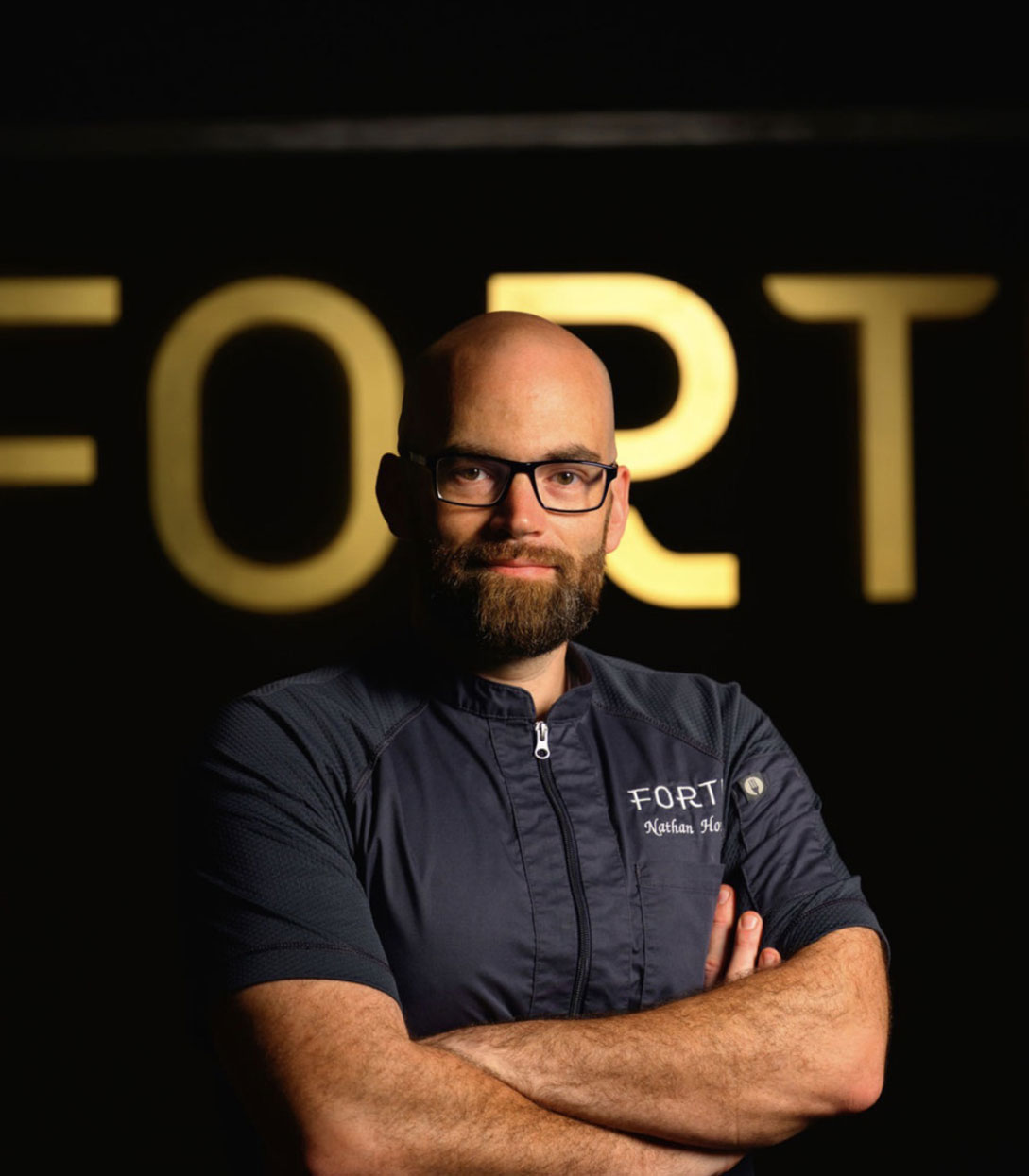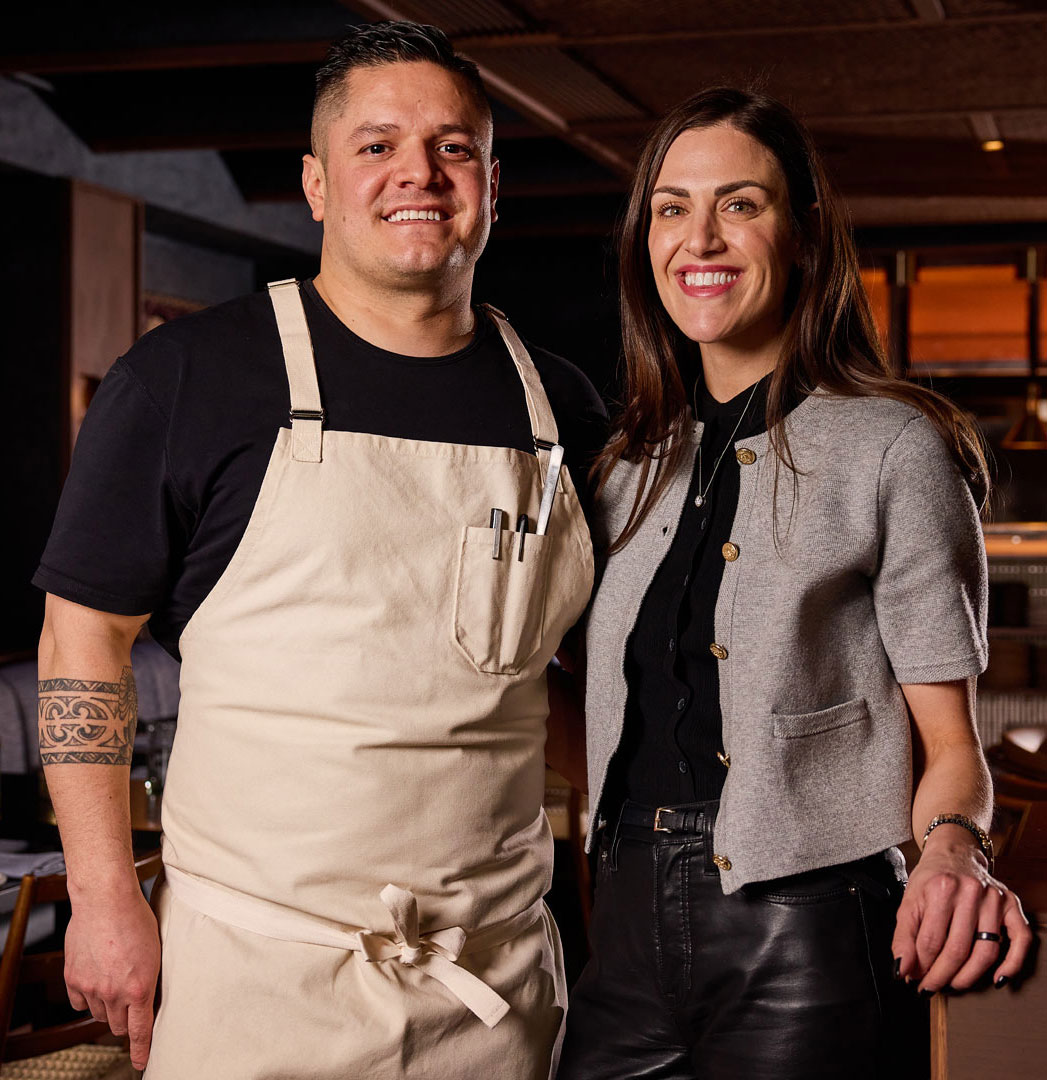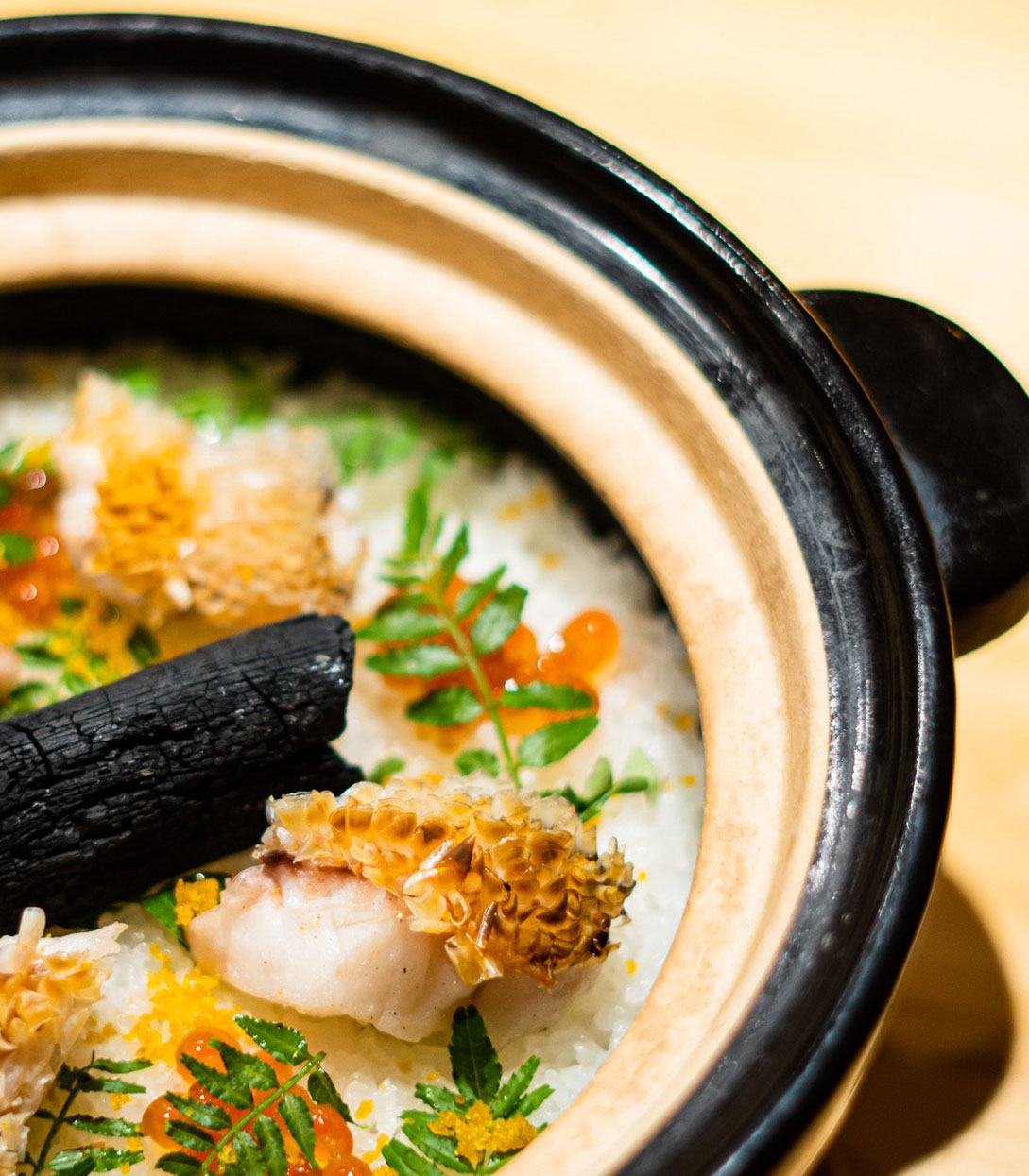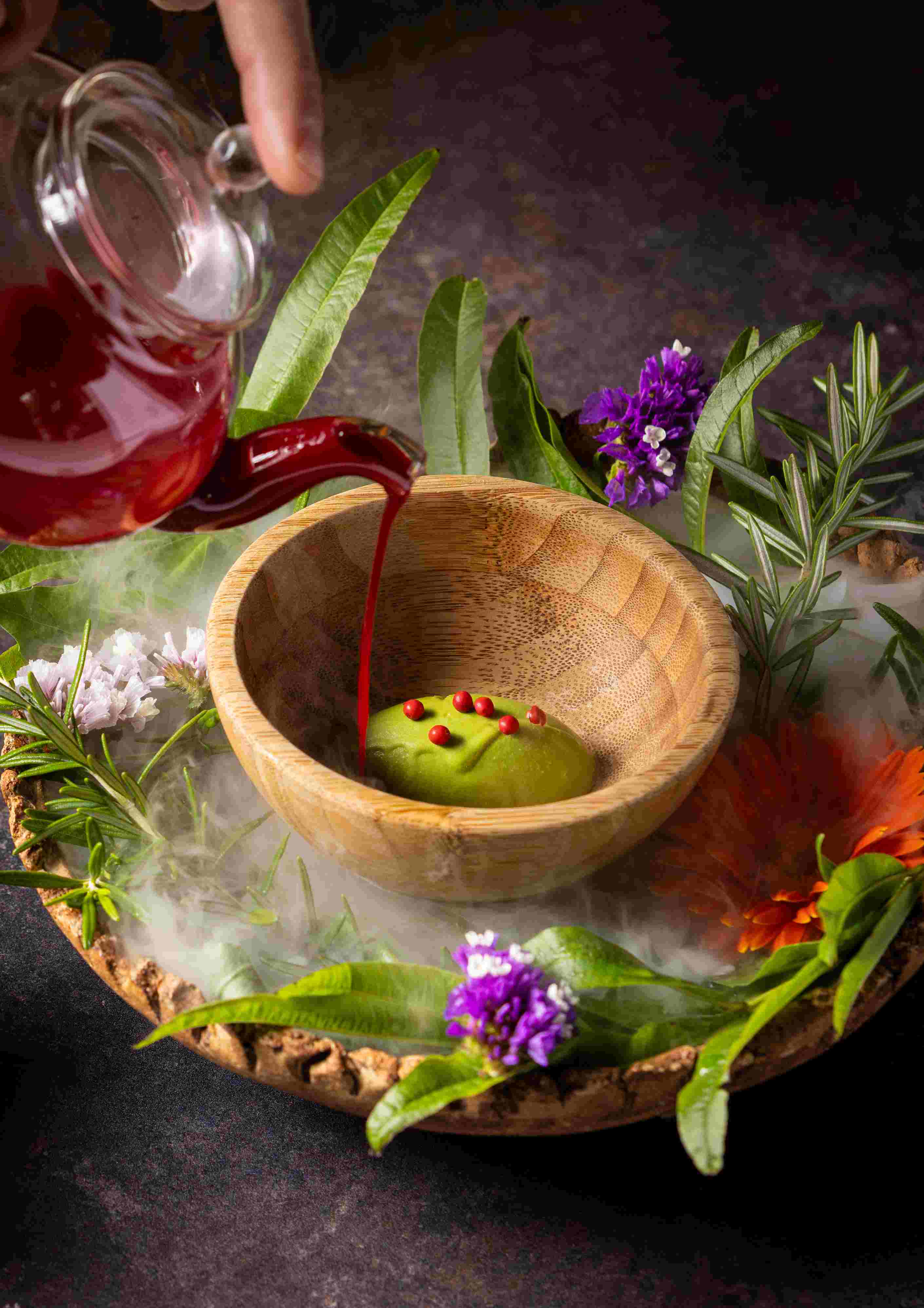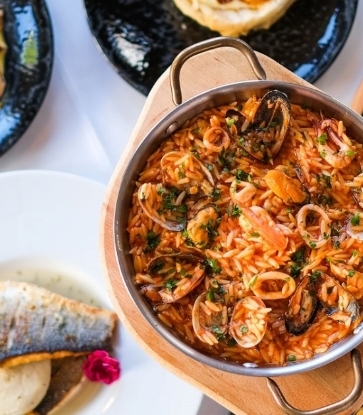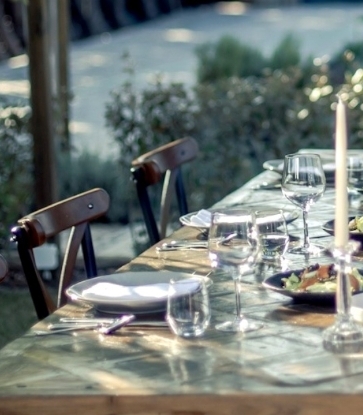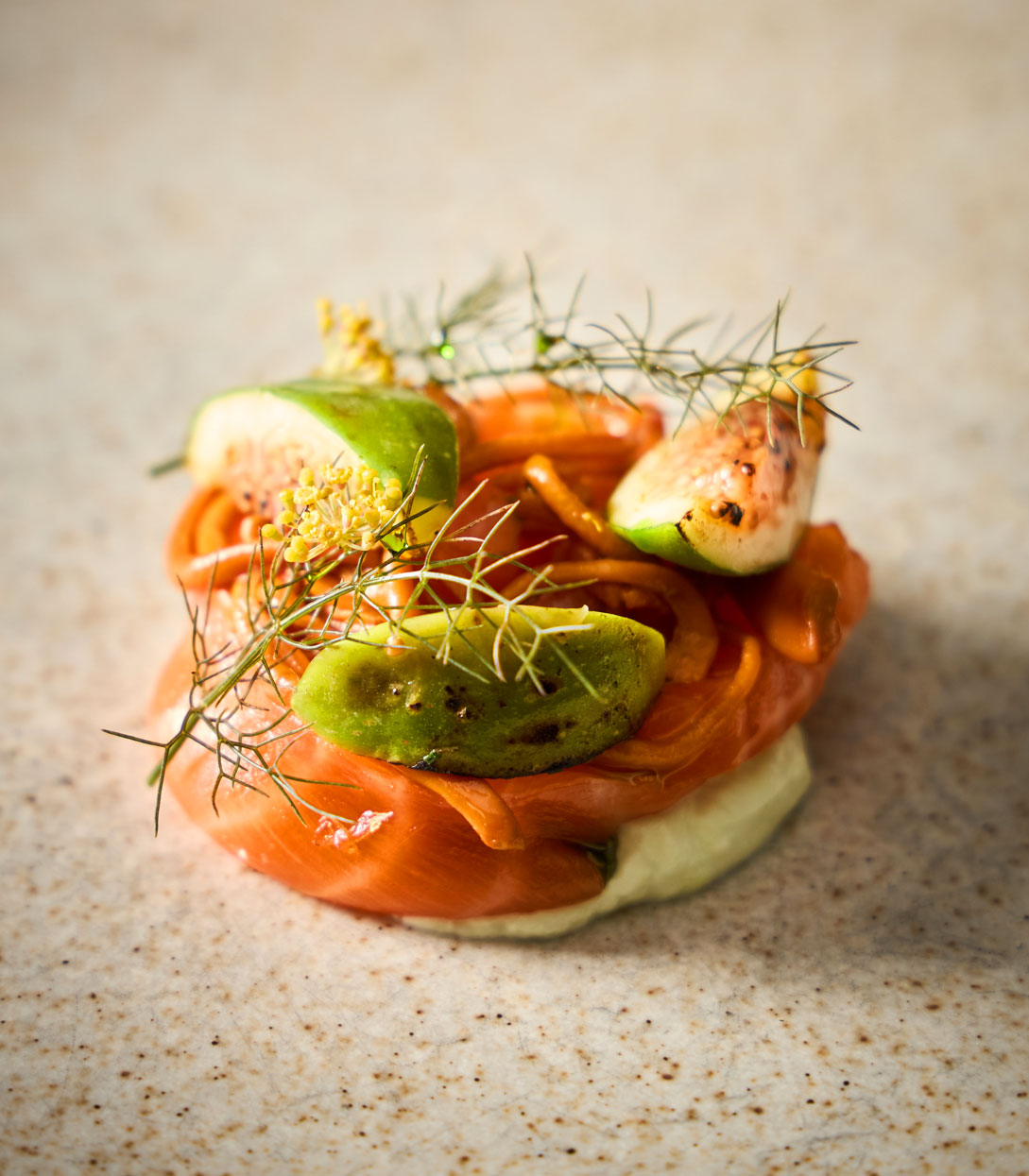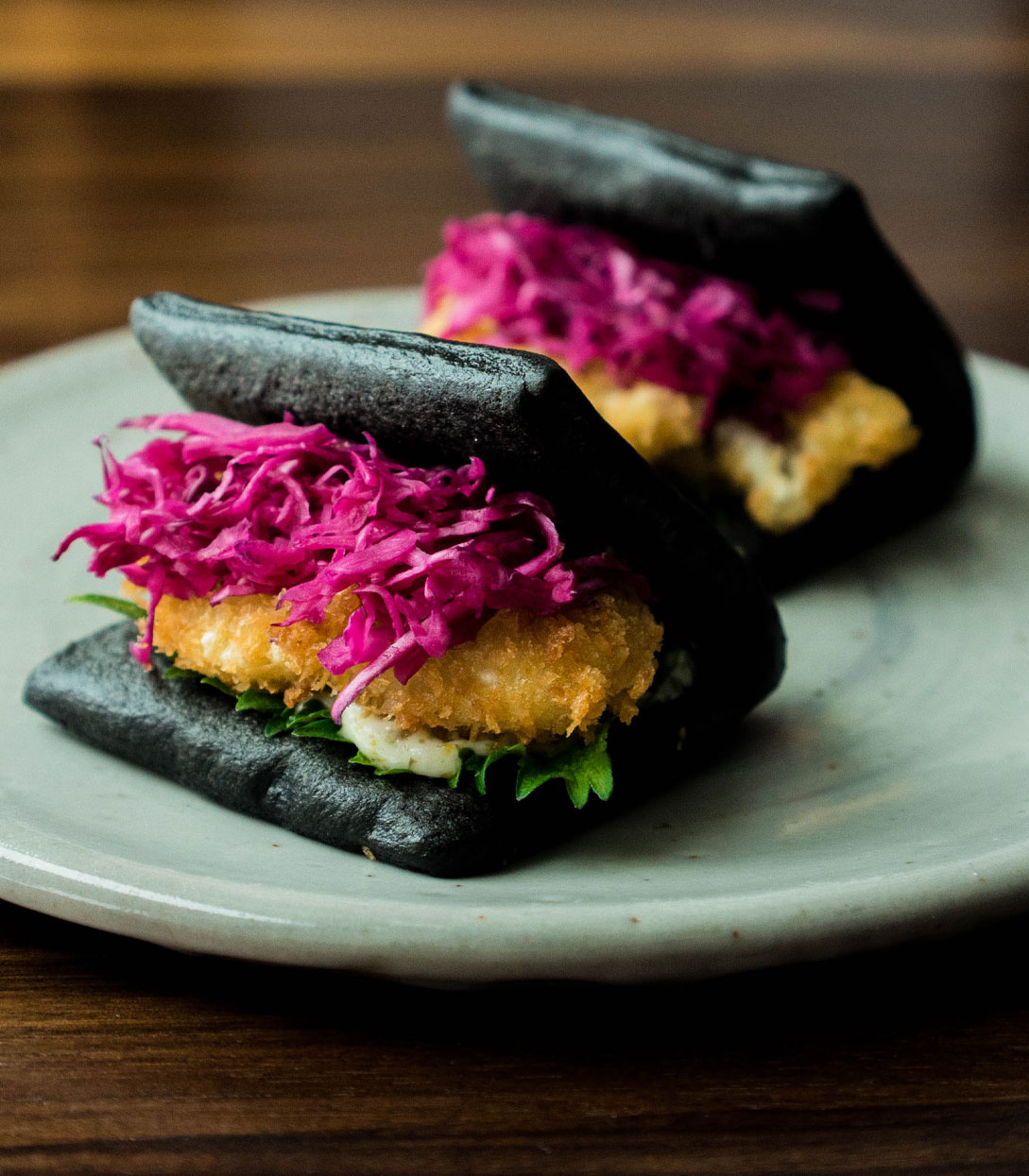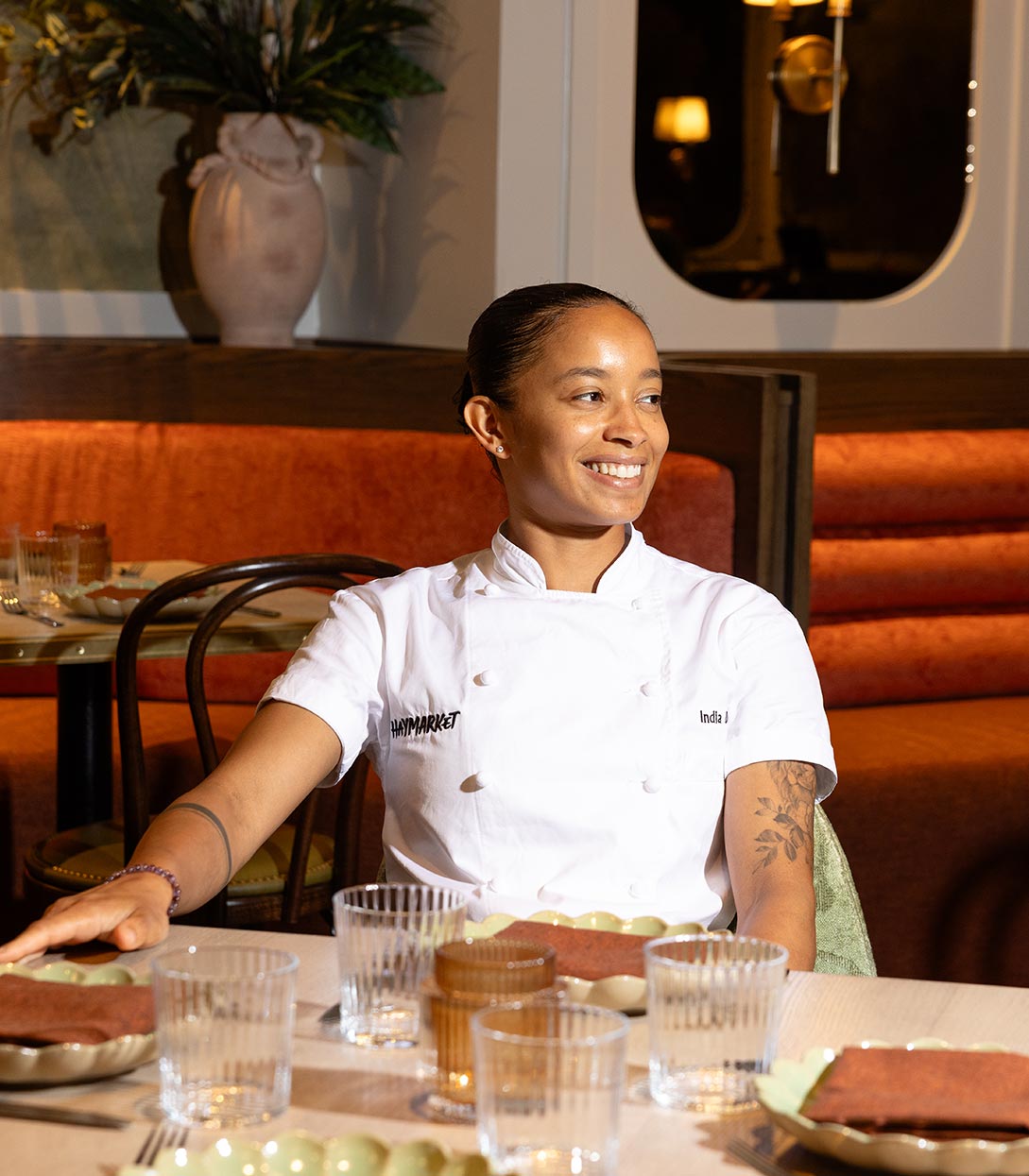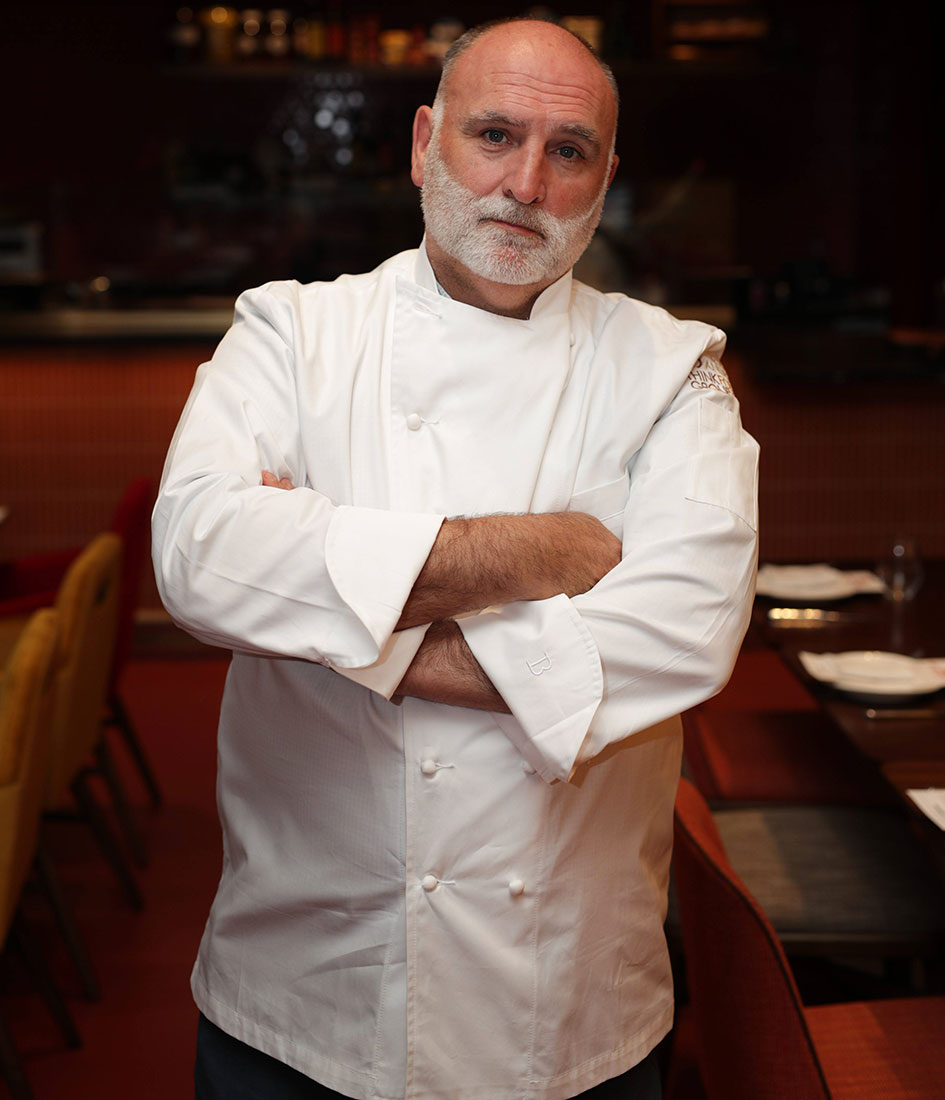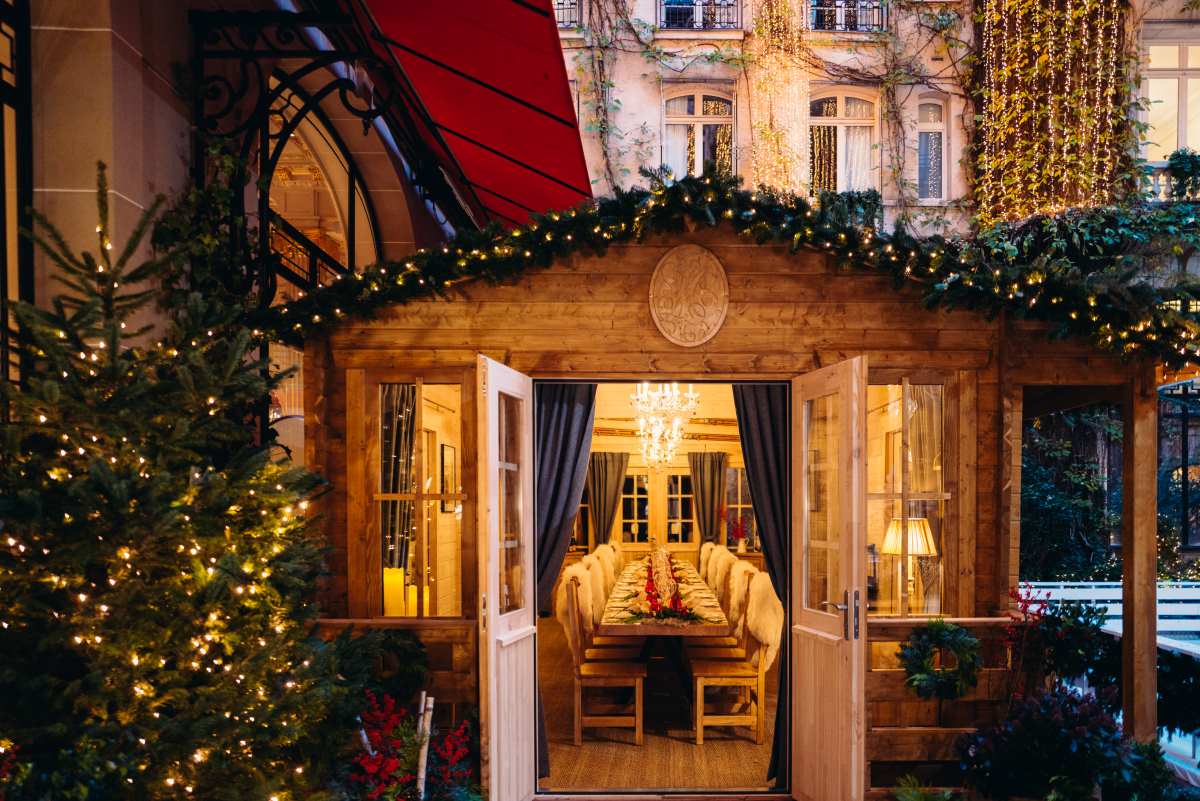A storied luxury hotel since its opening in 1925, Le Bristol has more suites than guest rooms, not to mention, a stunning teak lined swimming pool with sweeping Paris views, an actual mill for producing its own flour, and, of course, a Three-MICHELIN-Star restaurant. Frequented over the last century by celebrities from Josephine Baker to Woody Allen, Le Bristol is the stuff of legends.
The same can be said of its (numerous) kitchens. Épicure counts 40 cooks divided into two teams, one for the lunch service and one for dinner. Managing this sort of team requires rigorous organization. Arnaud Faye, who holds the prestigious title of Meilleur Ouvrier de France, took the reins last spring, succeeding chef Éric Frechon, who was at the hotel for 25 years.
Faye tells The MICHELIN Guide, "The brigade is obviously highly structured: a first sous-chef, a second, a third, and chefs de partie, who supervise the different posts. But everything is designed—even geographically—to encourage mutual support and fluidity, whether between the stations or with the front of house. I myself act as a stopgap when things get tight." A pillar of Le Bristol’s kitchen remains chef Franck Leroy, a guardian of its traditions who has been at the hotel even longer than Éric Frechon. His presence ensures continuity as Faye takes on the monumental task of leading the brigade.
In this dynamic environment, Faye is quietly reshaping the culinary landscape at Le Bristol, blending heritage with a very contemporary vision to craft a new era of dining.

Fostering Open Communication and Harmony in the Kitchens
From his glass-paned office in the midst of the kitchens, Faye maintains close ties to his teams. "I communicate through daily conversations, letting my colleagues mull over the new menus. The aim is to get our brains working, not just our hands. This participatory approach brings people together and stimulates creativity."
Despite the constraints of a large brigade, he is careful to foster a positive atmosphere with a healthy work-life balance. "It's just like with a top-level athlete: a balanced lifestyle plays a crucial role in performance and quality of work."

A Historical and Living Institution
As Head of Kitchens at Le Bristol, Arnaud Faye oversees all of the hotel's culinary points of service: room service, Café Antonia, the MICHELIN-Starred brasserie 114 Faubourg and of course Épicure, the Three-Starred restaurant. Naturally, he has put his stamp on all of the dishes. "We've already changed up the menus five or six times, [guided by] the seasons."
But Faye sees himself as more than just the head chef—he's also an ambassador for France's gastronomy and art de vivre. "My aim is to maintain typical French excellence with an inimitable Parisian touch," he says.

The Self-Appointed 'Head Grocer' of a Palace-Hotel
So, how do you step into the shoes of Éric Frechon, one of France's most celebrated chefs? In Faye's case, the answer is simple: with quiet confidence.
Faye has spent years earning his stripes in culinary excellence à la française in the discipline of palace hotel kitchens around France (from Espadon at the Ritz Paris to La Chèvre d'Or in Èze). At Épicure, he is rolling out his contemporary vision of haute gastronomy, which is enshrined in respect for ingredients, colleagues, and producers.
When it comes to gastronomy, Paris has been a strategic crossroads since the Middle Ages and boasts an incomparable local bounty. The chef himself selects produce thoughtfully and maintains a close connection with all of his suppliers.
"I work with small-scale producers and have been building relationships with some of them for years. Some were surprised that I remembered them when I took up my post here." He playfully describes himself as Le Bristol's "head grocer."

A Chef Defined by Competition and Precision
"I’m a man of competitions," says Faye, highlighting how challenges have shaped his career. Through prestigious competitions like the Bocuse d'Or and the Meilleur Ouvrier de France, in which he competed four times and was crowned in 2019, Faye has honed his style and discipline. He views this achievement as both a tribute to his mentors and a way to give back by passing on what he’s learned.
For Faye, these competitions are not just contests but schools of discipline and precision. His commitment to excellence extends beyond the kitchen, as he continues to support his team. "Last year, two of my team members won competitions. It builds their confidence and helps us grow as a unit."
Today, Faye describes his cuisine as "contemporary classic," a label he embraces with pride. "For me, classic doesn’t mean boring. It’s about ingredient-led dishes, aiming for intensity and purity of flavor. I prefer simplicity—one ingredient, one accompaniment, one sauce. I’ve moved beyond the tendency to overcomplicate. The goal is for the client to truly understand what they are eating."
Dishes like Brittany crab with buckwheat, samphire, and a light roe mayonnaise, and langoustine paired with fennel, mandarin orange, beef marrow, and watercress reflect his pursuit of simplicity and freshness, driven by the seasons.
The chef likens his signature sauces and jus to wine tasting. "You need an initial impression, a mid-palate, and a finish. Each sauce is crafted like a symphony of flavors." Needless to say, the chef incorporates all the latest techniques, such as cryoconcentration, extraction, and freeze-drying. "But these innovations must remain invisible to customers; they are there to serve the flavor, not as a technical demonstration. The customer shouldn't have to guess what's in our heads."


Grounded in Tradition and Influence
Faye, originally from Auvergne, in central France, traces his passion for ingredients back to his childhood. "My grandfather, a miner, had a vegetable garden. I spent hours gathering vegetables with him—such wonderful memories. That connection with the land has had a lasting influence on my cooking." At Épicure, Faye brings his childhood experiences into the kitchen, preparing rabbit—a "modest" ingredient that carries the essence of his time spent with his grandfather.
Later, as a boarder at La Chaise-Dieu hotel and catering school, Faye discovered the world of gastronomy through the pages of Burgundy Stars: A Year in the Life of a Great French Restaurant, a book about Bernard Loiseau that he read while tucked in bed. It ignited his ambition to reach the heights of French cuisine, travel the country, and earn MICHELIN stars. Fate would have it that he worked with several chefs who shaped his path, including Patrick Bertron, former sous-chef to Bernard Loiseau, Antoine Westermann at Le Buerehiesel, and Jean-Georges Klein at L'Arnsbourg. "These experiences taught me to respect ingredients and pursue excellence. I’ll never forget shelling 50 kilograms of peas with Chef Klein."

A Timeless, Proustian Moment
As Le Bristol marks its centenary, Faye is becoming part of the legacy of this institution, while bringing in his own velvety style of cooking. For him, a perfect meal "is one that makes you forget everything that's going on outside. If the customer feels transported, if time seems to stand still, even for a moment, then you've done what you set out to do."
Though the famed French 20th century writer Marcel Proust never visited Le Bristol—having passed away three years before its opening in 1925—his ghost, and his poignant exploration of time lost and regained in his writings, seem to echo through the transformation Faye is quietly bringing to the hotel, where moments of culinary transcendence feel timeless.
Hero Image : Tourteau © Georges Rouzeau/Michelin





